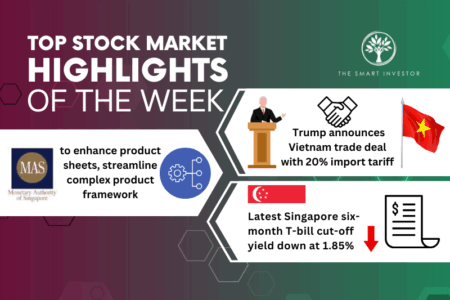United Overseas Bank Ltd (SGX: U11), or UOB, is one of Singapore’s three big banks.
The group has a global network of more than 500 offices in 19 countries and is rated as one of the world’s top banks.
Led by chairman and tycoon Wee Cho Yaw along with his son Wee Ee Cheong (as CEO), the bank has grown organically and through a series of acquisitions since its incorporation in 1935.
Investors who are looking for exposure to Asia’s banking industry may want to consider owning shares in UOB.
Here are five interesting aspects of UOB that you may not have known.
Record-high net profit for 2019
UOB reported record net profit of S$4.3 billion last year, up 8% year on year.
This growth was driven by a 10% year on year increase in total revenue, crossing the S$10 billion mark.
The increase in revenue came from a 3% year on year growth in total loans, as well as an improvement in trading and investment income.
Due to the bank’s strong earnings, it recommended a special dividend of S$0.20 and a final dividend of S$0.55.
Together with the interim dividend of S$0.55, the total dividend for 2019 was S$1.30, for a dividend payout ratio of 50%.
UOB’s trailing 12-month dividend yield stands at 5.8% at the last traded share price of S$22.28. If the special dividend was adjusted out, the yield drops to 4.9%.
A higher impairment charge for 1Q 2020
Let’s move on to the first quarter of 2020 (1Q 2020).
Due to the effects from the COVID-19 pandemic, UOB has increased its total impairment charge for bad loans to S$286 million from just S$93 million during the same period last year.
A further S$260 million was set aside under its “Regulatory Loss Allowance Reserve” (RLAR) to buffer against future loan losses. This amount was just S$53 million a year ago.
Non-performing loans (NPL) ratio has risen slightly to 1.6% due to the deterioration in a few significant accounts. The NPL ratio stood at 1.5% in the first quarter of 2019.
Low exposure to the oil and gas industry
In late April, oil prices suffered a debilitating crash due to a glut in oil supplies.
Back then, prices plunged to a 21-year low of around US$20.4 per barrel.
The low oil price and subsequent weak demand for oil have resulted in increased financial stress for oil and gas companies.
As of 31 March 2020, UOB’s exposure to this sector stood at around 3.6% of its total loan book of S$278 billion, at S$10.2 billion.
This exposure was a decline from the 4.7% level during 30 June 2018.
Of this S$10.2 billion, around 75%, or S$7.6 billion, belonged to downstream oil players and traders. 70% of this group are national oil companies and global firms.
The remaining 25% of the oil and gas loans were to the most vulnerable sub-segment — upstream industries, which are the first to be adversely impacted by an oil price decline.
Weaker net interest margin
The net interest margin (NIM) for the bank declined from 1.79% in the first quarter of 2019 to 1.71% in the most recent quarter.
This decline was due to an overall lower interest rate environment globally as countries slashed their rates to stimulate growth during the pandemic.
As a comparison, full-year 2018 and 2019 NIM was at 1.82% and 1.78%, respectively.
Interest rates are anticipated to stay low for an extended period as the global economy contracts.
UOB may continue to see weakening NIMs in subsequent quarters.
Healthy growth in loan book
It is not all gloomy for the bank, though.
Despite the higher impairment charge and weaker NIM, the bank did manage to grow its loan book.
In Singapore, gross loans increased by 2% year on year to S$141 billion, while North Asia saw a slightly higher increase at 5% year on year.
Moving forward, the increase in loan book can help to offset persistent weakness in NIMs, thereby mitigating the decline in net interest income for the bank.
Investors should also note that the bank can also try to boost its non-interest income to make up for the decline in net interest income.
With share prices battered to multi-year lows, many attractive investment opportunities have emerged. In a special FREE report, we show you 3 stocks that we think will be suitable for our portfolio. Simply click here to scoop up your FREE copy… before the next stock market rally.
Click here to like and follow us on Facebook and here for our Telegram group.
Disclaimer: Royston Yang does not own shares in any of the companies mentioned.





